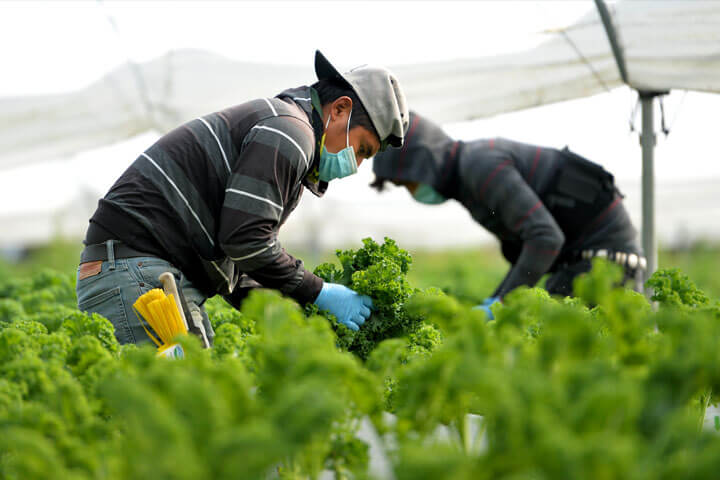Immigrate to Canada through the Agri-Food Pilot Programme
The Agri-Food Immigration Pilot is a new immigration program aimed at bringing in skilled workers to help address the labour needs of the Canadian agri-food sector.
Learn More

The Agri-Food Pilot Programme
The Agri-Food Pilot Programme is designed to address the labour needs of the Canadian agri-food sector by providing a pathway to permanent residency for experienced workers in eligible occupations. The pilot is set to run until May 2023.
- The pilot is employer-driven, which means that eligible employers must apply to become designated to participate in the program and can only recruit workers for eligible occupations.
- The program has a maximum of 2,750 applications per year, with a cap of 750 applications per occupation.
- Applicants must have a valid job offer from a designated employer in Canada and meet other eligibility requirements, including language proficiency and education.
- Successful applicants will receive a work permit and can gain Canadian work experience before being eligible to apply for permanent residency.
Requirements
1. Job Offer from a Designated Employer
Applicants must have a valid job offer from a designated employer in Canada. The job offer must be for a full-time, permanent position in an eligible occupation.
2. Work Experience
Applicants must have at least one year of full-time work experience in Canada in an eligible occupation within the past three years.
3. Language Proficiency
Applicants must meet the language requirements for their occupation. This includes taking an approved language test and obtaining a minimum score.
Explore Canada Permanent Resident Visa Options
Application Process
1. Find a Designated Employer
Applicants must first find a designated employer in Canada who is eligible to participate in the Agri-Food Pilot Program and obtain a valid job offer.
2. Apply for Work Permit
Once a job offer is secured, applicants can apply for a work permit under the Agri-Food Pilot Program. This requires submitting the necessary documents and paying the applicable fees.
3. Obtain Work Permit
After submitting the application, the Immigration, Refugees and Citizenship Canada (IRCC) will review the documents and verify the eligibility of the applicant. If the application is approved, the applicant will receive a work permit allowing them to work in Canada in the designated occupation for the designated employer.
4. Gain Canadian Work Experience
Once the work permit is obtained, the applicant can start working in Canada and gain Canadian work experience in the designated occupation. This is a crucial step towards being eligible for permanent residency.
5. Apply for Permanent Residency
After gaining the required Canadian work experience, the applicant can apply for permanent residency through the appropriate immigration program, such as the Express Entry or Provincial Nominee Program, depending on the specific requirements and eligibility criteria.
Benefits
1. Pathway to Permanent Residency
The Agri-Food Pilot Program provides a pathway to permanent residency for eligible applicants, allowing them to settle in Canada permanently and enjoy the benefits of Canadian citizenship, such as access to healthcare, education, and social services.
2. Canadian Work Experience
Applicants who successfully obtain a work permit under the Agri-Food Pilot Program can gain valuable Canadian work experience, which can enhance their resume and improve their chances of finding employment in Canada in the future.
3. Opportunity to Work in the Agri-Food Sector
The Agri-Food Pilot Program specifically targets occupations in the agri-food sector, which is a key industry in Canada. Applicants who are passionate about agriculture and food production can have the opportunity to work and contribute to this important sector in Canada.
Frequently Asked Questions
Who is eligible for the Agri-Food Pilot Program?
Applicants who are currently working in Canada in one of the eligible occupations in the agri-food sector, have a valid job offer from an eligible employer, meet the language proficiency requirements, and have the necessary education and work experience may be eligible for the Agri-Food Pilot Program. It is important to review the specific eligibility criteria and requirements outlined by the Immigration, Refugees and Citizenship Canada (IRCC) to determine eligibility.
How long does it take to obtain permanent residency through the Agri-Food Pilot Program?
The processing times for permanent residency applications can vary depending on the specific immigration program through which an applicant applies, as well as other factors such as the completeness of the application, the complexity of the case, and the volume of applications being processed. It is recommended to review the most up-to-date processing times on the IRCC website for accurate information.
Can my family accompany me to Canada under the Agri-Food Pilot Program?
Yes, eligible applicants under the Agri-Food Pilot Program may be able to include their family members, such as spouses or common-law partners, and dependent children, in their application for permanent residency. However, additional documentation and requirements may apply for family members accompanying the main applicant to Canada.
What are the language requirements for the Agri-Food Pilot Program?
Applicants under the Agri-Food Pilot Program are required to demonstrate proficiency in English or French, which are the two official languages of Canada. The specific language requirements may vary depending on the occupation and immigration program, and can be demonstrated through language tests approved by the IRCC, such as the International English Language Testing System (IELTS) or the Canadian English Language Proficiency Index Program (CELPIP).
Contact Us
If you have any questions or need further information about the Canada Agri-Food Pilot Immigration Program, please don't hesitate to contact us. Our team of immigration experts is here to assist you.